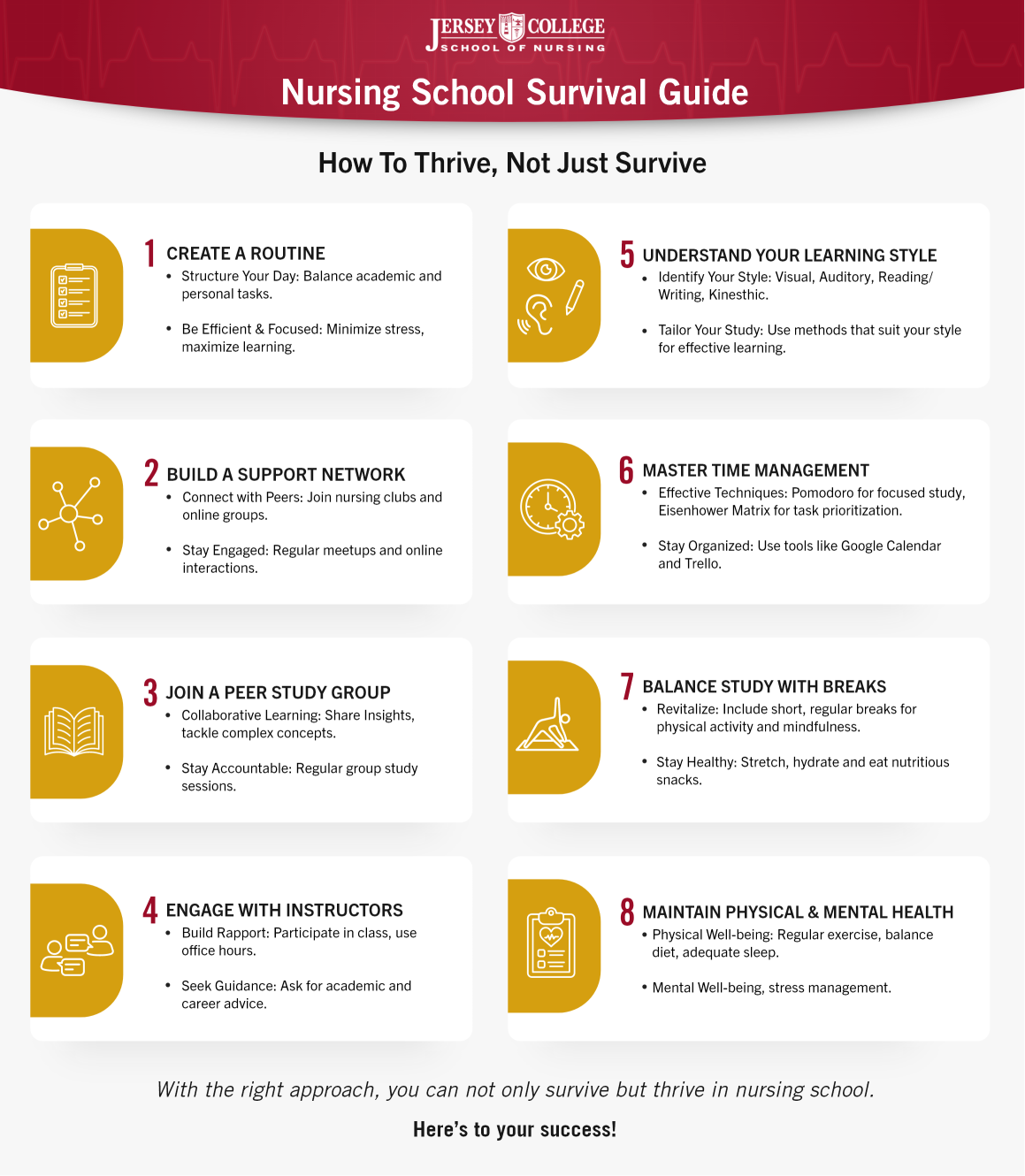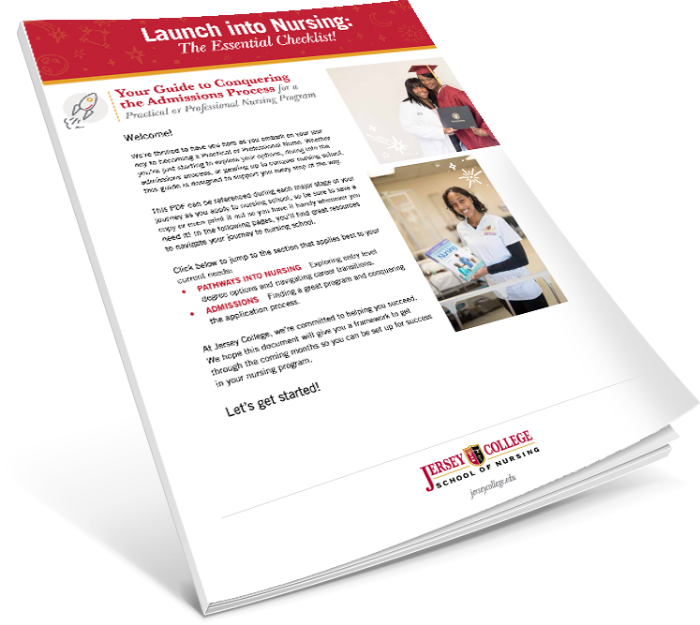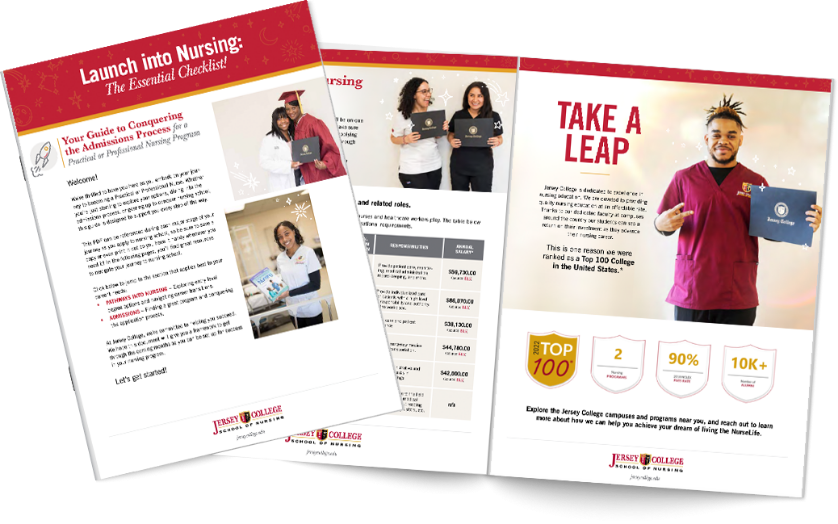
Nursing School Survival Guide: How to Thrive, Not Just Survive
Nursing school is often described as one of the most challenging yet rewarding educational paths you can choose. From mastering complex medical concepts to juggling clinical rotations and exams, the journey is fraught with various hurdles. But with the right preparation and planning, these challenges can become stepping stones to a fulfilling career.

1. Create a Routine
A well-planned daily routine is crucial for success in nursing school. It brings structure to your day and helps you manage your academic and personal responsibilities efficiently.
The Importance of Routine
A routine minimizes decision fatigue and allows you to focus on learning and problem-solving, which means you are better equipped to meet your deadlines and reduce last-minute stress.
Tips for a Balanced Routine
- Prioritize Tasks: Allocate time for important tasks.
- Be Realistic: Make your routine achievable.
- Include Breaks: Short breaks improve focus.
- Self-Care Time: Don't forget exercise and relaxation.
- Review and Adjust: Tweak your routine as needed.

FREE Essential Guide to Nursing School: Get Accepted, Survive, and Thrive!
2. Find Peers and Build a Support Network
Navigating the complexities of nursing school becomes more manageable with a strong support network. Your peers can offer emotional support, academic insights, and even partnership in study groups.
Tips for Building a Support Network
- Join Campus Organizations: Participate in nursing student associations or clubs to meet peers.
- Utilize Social Media: Use platforms like Facebook or LinkedIn to join nursing student groups.
- Be Open and Approachable: A friendly demeanor invites connections.
- Maintain Relationships: Keep in touch with peers through regular meetups or online check-ins.
By actively seeking and maintaining a strong peer network, you'll have a valuable resource for overcoming the challenges of nursing school.
3. Join a Peer Study Group
While a general support network is valuable, a dedicated peer study group offers specific educational benefits. Study groups provide a collaborative environment that enhances learning and helps you grasp complex nursing concepts more effectively.
The Importance and Benefits of Working with a Peer Study Group
Peer study groups offer diverse perspectives and problem-solving approaches, making it easier to understand challenging material. They also provide accountability, helping you stick to a study schedule.
How to Find or Form a Study Group
- Class Announcements: Use class time to ask if anyone is interested in forming a study group.
- Online Forums: Utilize school-specific forums to find like-minded peers.
- Library Boards: Some libraries have bulletin boards where study groups can post notices.
Making the Most of Group Study Sessions
- Set an Agenda: Outline what topics will be covered during each session.
- Assign Roles: Designate a facilitator, a timekeeper, and a note-taker.
- Review and Quiz: End each session by reviewing key points and quizzing each other.
4. Get to Know Your Instructors
Building a positive relationship with your instructors can offer more than just academic advantages; it can also open doors to mentorship and personalized guidance.
The Benefits of a Good Relationship with Professors
A strong rapport with instructors can lead to opportunities for one-on-one tutoring, personalized feedback, and even career advice. Their expertise can provide you with unique insights into the nursing field that go beyond the classroom.
Tips for Building Rapport
- Be Engaged: Show interest in class discussions and ask thoughtful questions.
- Office Hours: Make use of instructor office hours for additional learning and to show your commitment.
- Be Respectful: Always be punctual, and respect both their time and opinions.
- Seek Mentorship: Don't hesitate to ask for academic guidance or career advice.
By taking the initiative to get to know your instructors, you're not just enhancing your educational experience but also laying the groundwork for potential mentorship opportunities.
5. Understand Your Learning Style
Knowing your learning style can significantly improve your academic performance in nursing school. Different learning styles cater to various methods of absorbing and processing information.
Common Learning Styles
- Visual: Best learn by seeing. Diagrams and color-coded notes can be helpful.
- Auditory: Prefer to learn through listening. Group discussions and recorded lectures are effective.
- Reading/Writing: Learn best by reading and writing. Taking detailed notes is beneficial.
- Kinesthetic: Learn through doing and moving. Hands-on activities and walking while reviewing can be effective.
Identifying Your Learning Style
To discover your learning style, you can take an online assessment like the Education Planner Learning Styles Quiz. Alternatively, self-observation and reflection on past learning experiences can also be insightful.
Strategies for Optimized Learning
- Visual Learners: Use diagrams and color-coded notes.
- Auditory Learners: Engage in group discussions and listen to recorded lectures.
- Reading/Writing Learners: Take comprehensive notes and review them regularly.
- Kinesthetic Learners: Participate in labs and review materials while being physically active.
By understanding your learning style, you can tailor your study methods for more effective learning in nursing school.

Sign up to get new articles in your inbox and stay updated on our nursing programs.
6. Master Time Management Techniques
While having a routine sets the stage for effective time management, mastering specific techniques can elevate your productivity to the next level. Good time management is crucial for balancing academic responsibilities and personal well-being in nursing school.
The Importance of Time Management
Effective time management allows you to allocate sufficient time for studying, attending classes, and fulfilling clinical responsibilities, reducing stress and improving academic performance.
Time Management Techniques
- Pomodoro Technique: Work in bursts of focused time (usually 25 minutes), followed by a short break.
- Eisenhower Matrix: Prioritize tasks as urgent/important, important/not urgent, urgent/not important, or neither.
- Time Blocking: Similar to creating a routine, allocate specific blocks of time for different activities.
Tools and App Recommendations
- Google Calendar: For scheduling and reminders.
- Trello: For task management and project planning.
- Forest: An app that discourages phone usage during study time.
By incorporating these techniques into your routine, you'll be better equipped to manage your time effectively, allowing you to excel in both your academic and personal life.
7. Don’t Forget to Take Breaks
In the pursuit of academic excellence, it's easy to overlook the importance of taking breaks. However, strategic breaks can actually enhance your productivity and mental well-being.
Making the Most of Your Breaks
- Physical Activity: A quick walk or some stretching can revitalize you.
- Mindfulness: A few minutes of meditation can help clear your mind.
- Nutrition: Use this time to hydrate or have a healthy snack.
By incorporating effective breaks into your routine, you not only improve your productivity but also contribute to a healthier, more balanced lifestyle.
8. Take Care of Your Own Physical and Mental Health
Your physical and mental well-being are foundational to your academic success. Neglecting either can result in decreased focus and energy, which in turn can negatively impact your performance in nursing school.
The Importance of Physical and Mental Health in Academic Performance
Good physical health enhances cognitive function, increases energy levels, and improves focus. Similarly, mental well-being is crucial for maintaining motivation, reducing stress, and enhancing problem-solving skills—all essential for academic success.
Tips for Maintaining a Healthy Lifestyle
Physical Health
- Regular Exercise: Aim for at least 30 minutes of moderate exercise most days of the week.
- Balanced Diet: Incorporate fruits, vegetables, and lean proteins into your meals.
- Adequate Sleep: Strive for 7-8 hours of quality sleep per night.
- Regular Check-ups: Don't skip your routine medical check-ups, especially during stressful academic periods.
Mental Health
- Mindfulness and Meditation: These practices can help you become aware of your thoughts, feelings, and sensations, reducing stress and increasing focus.
- Talk Therapy: Sometimes talking to a professional or a trusted friend can provide valuable perspective and coping strategies.
- Self-Care: Allocate time for activities that bring you joy and relaxation.
- Stress Management: Utilize techniques like deep breathing, meditation, or even short walks to manage stress.
By prioritizing both your physical and mental health, you're setting yourself up for long-term success in nursing school and beyond.
Additional Resources
For further reading and to enhance your nursing school experience, consider the following resources:
Find Your Campus
Based on the success of our programs, we have grown to serve communities in 7 states (and counting!). Find a campus near you to start your NurseLife.

FREE Essential Guide to Nursing School: Get Accepted, Survive, and Thrive!
